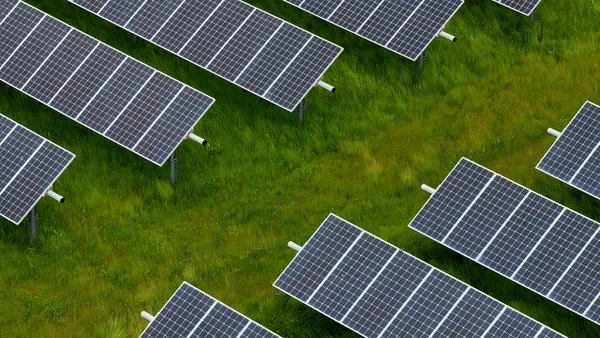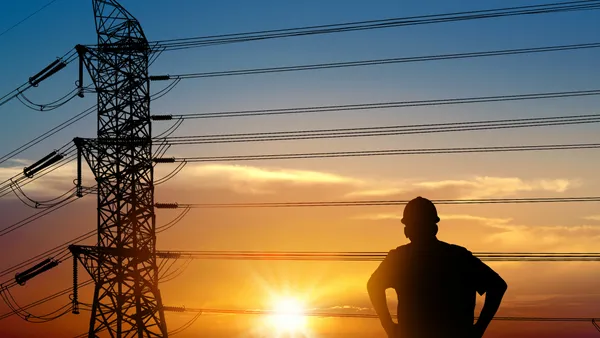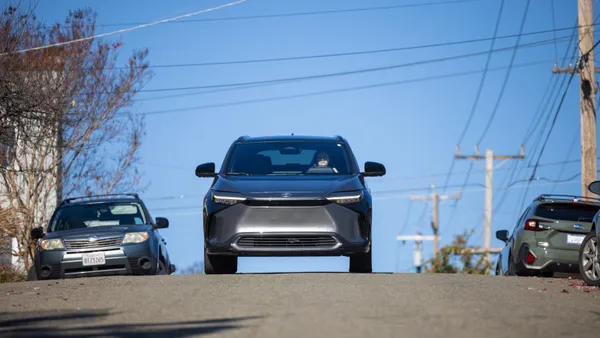Dive Brief:
- Electric vehicles (EV), including battery electric and plug-in hybrids, made up 7.2% of global car sales in the first half of 2021, up from 2.6% in 2019 and 4.3% in 2020, according to new data from BloombergNEF. In North America, EVs made up 3% of sales in the first half but industry observers say 5% is possible as second half sales pick up.
- "Global momentum towards zero-emissions road transport has accelerated significantly," BNEF said in a report released Wednesday on the transportation sector prepared for the 2021 United Nations Climate Change Conference (COP26).
- News of higher EV sales came alongside a commitment from General Motors, Ford and other automakers for all new car sales to be zero emission by 2040. Governments, including New York and California (but not the United States), also signed the pledge.
Dive Insight:
The uptake in electric vehicles is occurring faster than previously thought, driven by government decarbonization policies, falling battery prices and a growing number of models offered by automakers, BNEF's report concludes.
The firm expects EVs to make up 20-30% of sales in the United States, European Union and China by 2025, based on "proposed and confirmed rules" in those markets. President Joe Biden has set a goal for half of new passenger vehicle sales in the United States to be electric vehicles by 2030.
BNEF said 2021 is estimated to be "yet another record year for EV sales globally," with 5.6 million sold. That is 83% higher than 2020 and a 168% increase over 2019 sales, the firm said.
And in the two years since COP25, global momentum towards zero-emissions vehicles (ZEV) has "accelerated significantly," BNEF said. They will "capture a higher share of passenger vehicle sales, sooner than previously expected."
The long-term outlooks for battery electric and fuel cell vehicle adoption "have become more bullish in the last two years," the firm said. In 2019, BNEF's forecast for the the global passenger and commercial ZEV fleet was for 495 million of the vehicles on the road in 2040. Now, it expects 677 million vehicles by 2040.
There are almost 1.5 billion four-wheeled vehicles on the road today, BNEF said. The number grew about 1% this year.
Automakers have signaled they are committed to transportation electrification. BNEF's report found EV and fuel cell vehicle models available globally increased 37% since 2019. And 11 automakers on Wednesday committed to transitioning all of their sales to zero emission by 2040, and in some "leading markets" by 2035.
Along with GM and Ford, Jaguar Land Rover, Mercedes-Benz and Volvo Cars also signed the pledge.
"As automotive manufacturers, we will work towards reaching 100% zero emission new car and van sales in leading markets by 2035 or earlier, supported by a business strategy that is in line with achieving this ambition, as we help build customer demand," they said.
The COP26 meeting "marks the end of the road for the internal combustion engine," Climate Group CEO Helen Clarkson said in a statement. "Today we’re seeing significant commitments from manufacturers, investors, fleet operators, countries, cities, states and regions."
New York and California signed on to the ZEV pledge, though the United States did not. Toyota and Volkswagen also did not sign, nor did major markets like China, Germany and Japan, NPR pointed out.
A new report from global consulting firm Arcadis concludes New York and California "rival leading nations in government incentives and charging infrastructure," to advance electric vehicle adoption.
"With clear leadership from the top and the right policy levers in place, electric vehicles can play a notable role in tackling the climate crisis," Arcadis CEO Peter Oosterveer said in a statement.
There is also room for improvement, Arcadis noted. Given the physical and economic size of California and New York, the firm says that "both states could capture greater market share and drive carbon reductions through EV investment."
New York will need to focus on transitioning fleet vehicles to achieve its EV goals, while California could boost EV market share by building out charging infrastructure, the report said. The recent passage of a $1.2 trillion bipartisan infrastructure bill by federal lawmakers "is also expected to help accelerate EV adoption," Arcadis said.















